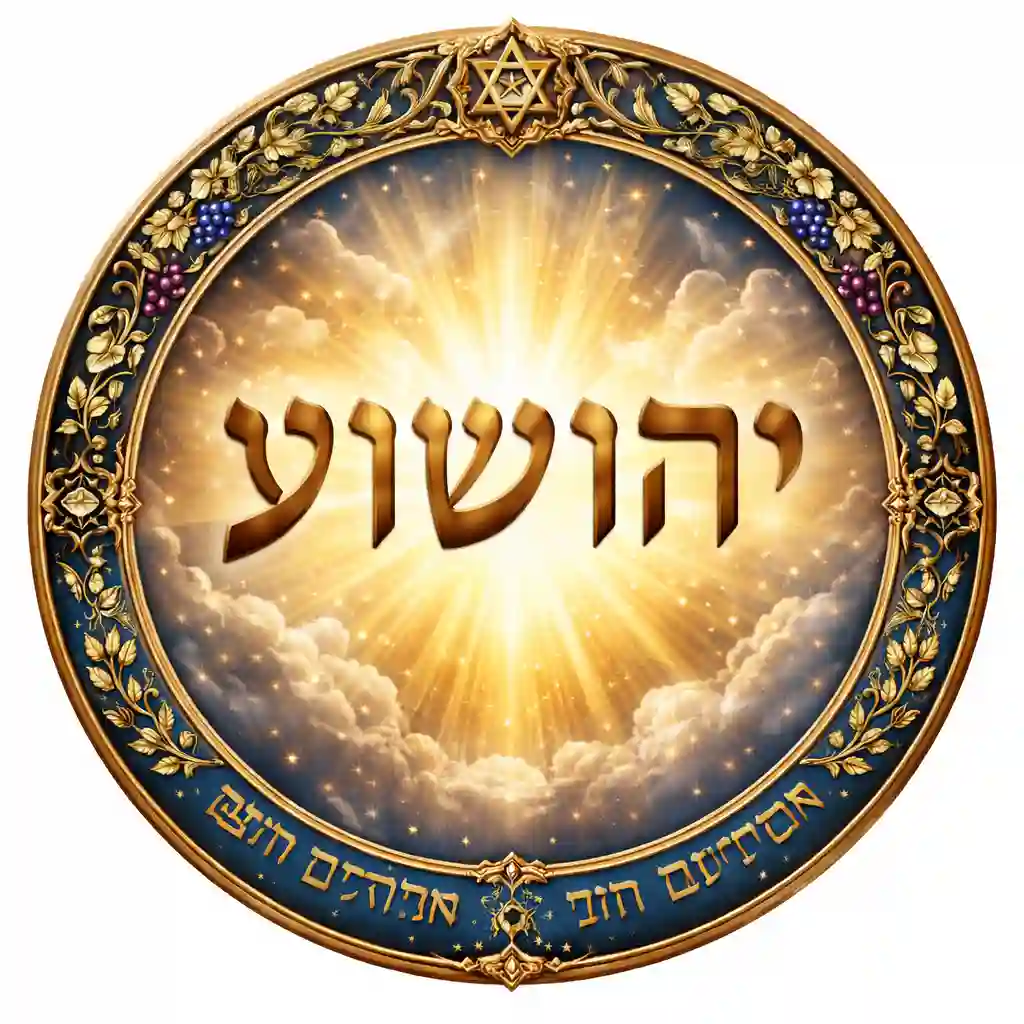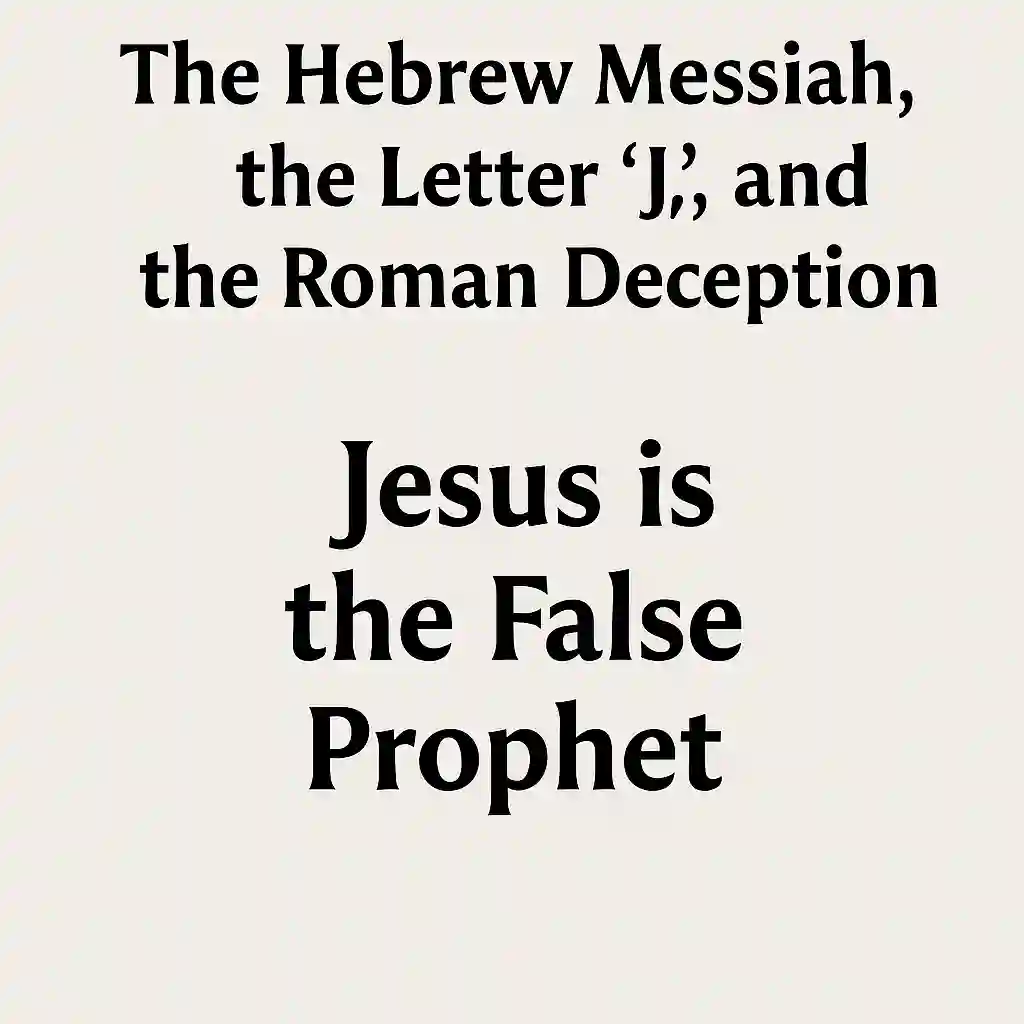Introduction

The Messiah warned that the path to life is narrow, and few there be that find it (Matthew 7:14). This is not because the way is hidden, but because it requires humility, obedience, and truth—qualities often exchanged for comfort and tradition. In that same chapter, He declares: “Many will say to Me in that day, ‘Lord, Lord…’ and I will declare to them, ‘Depart from Me, I never knew you’” (Matthew 7:22–23). Could part of that deception stem from embracing a name and system foreign to His identity? The shift from Yahusha—which declares Yahuah as Savior—to Jesus, a name formed through layers of Greek and Latin filtering, reflects more than language change; it signals a detachment from the covenant roots of faith. If knowing Him is essential, then knowing His name, His identity, and His commandments is not optional. The narrow path begins with truth, and His sheep know His voice—by name.
The Hebrew Messiah’s Name: Yahushua
The Messiah was born a Jew, from the line of David, into a Hebrew-speaking world. His name, given by heaven itself, was Yahushua (sometimes shortened to Yeshua). This name means “Yahweh saves”—a clear testimony to his mission and divine authority.
Hebrew names carry meaning. They are not arbitrary. The Messiah’s name connects him directly to the covenant name of God, YHWH (Yahweh). To call him anything else is to remove that divine connection, breaking the first and third commandments.
How the Hebrew Name of the Messiah Became “Jesus”
1. The Original Hebrew Name: יהושע (Yehoshua)
In the Hebrew Scriptures, the Messiah’s name was Yehoshua (יהושע), meaning “Yahuah is salvation.”
It combines two sacred roots:
- Yeho (יהו) — a shortened form of the divine name YHWH (Yahuah)
- Shua (שוע) — from yasha, meaning to save or deliver
Every Hebrew name is deliberate. In this case, Yehoshua proclaims the saving power of Yahuah Himself—a statement of divine mission and identity, not a random label.
Example: Joshua, son of Nun, shared this same name—Yehoshua. There was never a “Jesus” in the Hebrew text.
2. From Hebrew to Aramaic and Greek: Yeshua → Iēsous
By the first century, Hebrew commonly shortened Yehoshua to Yeshua (ישוע)—a form found in Ezra and Nehemiah.
But when the message of the Messiah spread into the Greek-speaking world, several challenges appeared:
| Hebrew | Sound | Greek Equivalent | Result |
|---|---|---|---|
| Ye | “Y” doesn’t exist in Greek | Ιη (Ie) | Ie- |
| sh | “sh” doesn’t exist | σ (s) | s |
| ua | Greek masculine endings | ους (ous) | -sous |
So Yeshua became Iēsous (Ιησούς). The transformation was linguistic necessity—not conspiracy—but it still stripped the name of its Hebrew sound and meaning.
3. From Greek to Latin: Iēsus
When the text passed to the Latin-speaking Roman Church, Iēsous became Iēsus.
At this time:
- The Latin alphabet had no “J.”
- The letter “I” served double duty for both I and J sounds.
So early Latin Bibles and writings recorded Iēsus, not “Jesus.”
4. Into English: The Invention of “J”
The letter J was invented around 1524 by the Italian scholar Gian Giorgio Trissino, originally as a decorative variation of “I.”
By the 17th century, English began to pronounce “J” as we know it today.
That’s when “Iēsus” became “Jesus.”
The Messiah of Israel lived long before the letter J existed.
He could never have been called “Jesus.”
5. Why Hebrew Names Matter
In Hebrew culture, a name is sacred—an extension of one’s essence and purpose.
Names are not arbitrary. Examples include:
- Abram → Abraham — “father of many nations”
- Ya’akov → Yisrael — “he struggles with God”
- YHWH — “I Am That I Am” (Exodus 3:14)
When Yeshua was named, the angel said:
“You shall call His name Yeshua, for He shall save His people from their sins.” (Matthew 1:21, Hebrew context)
The name itself defined His mission—salvation. Translating it away erased that direct connection.
6. Why It Still Matters Today
Many people call on Jesus with genuine faith—and intent is never meaningless—but understanding His true Hebrew name reconnects faith to its original covenant roots.
It reminds believers that salvation came from Israel, not from Rome or later European translations.
Yehoshua (Yeshua) means:
“Yahuah saves.”
That truth stands unchanged—but remembering His real name restores the prophetic, cultural, and linguistic depth of the Scriptures.
The Letter “J” and Why “Jesus” Could Not Exist
One of the most overlooked facts in history is that the letter “J” did not exist in any language until the 16th century. The English alphabet, influenced by Latin, did not include “J” until it was distinguished from “I” by Renaissance scholars. Before this, there was no “J” sound in Hebrew, Greek, or Latin.

That means in the first century—when the Messiah walked the earth—no one could have called him “Jesus.” The name did not exist. Instead, his name was transliterated from Greek as Iesous (Ἰησοῦς), and later into Latin as Iesus. Only after the letter “J” was introduced in English did “Iesus” become “Jesus.”
Thus, the familiar name “Jesus” is less than 500 years old—far removed from the original Hebrew name that carries divine meaning.
Rome’s Role in the Name Change
The Roman Empire played a powerful role in reshaping the faith of the early believers. After Constantine’s adoption of Christianity in the 4th century, the empire sought to unify religion under Roman authority. This included separating the faith from its Hebrew roots.
- The Sabbath was changed from the seventh day to the first day.
- Hebraic festivals were replaced with Roman ones, like Easter and Christmas.
- And most significantly, the Hebrew name of the Messiah was exchanged for a Greco-Roman substitute.
By adopting Iesus—and later “Jesus”—Rome severed the connection to the Hebrew God’s name, diluting the truth for generations. This was not merely translation. It was transformation, stripping away Yahweh’s covenant identity from the Messiah.
The False Prophet of the Nations
If the Messiah came in the name of Yahweh, then a figure who comes in a man-made name is a counterfeit. The Scriptures warn us of false prophets and deceivers who would mislead the nations. The promotion of “Jesus” as a Greco-Roman savior, rather than Yahushua the Hebrew Messiah, fits this pattern.
“Jesus” is a name invented by empire, attached to a religion that replaced God’s Torah with Roman traditions. The true Messiah never bore that name. Therefore, “Jesus” is not the Messiah, but a false prophet constructed to lead the nations astray.
Conclusion
The historical record is undeniable:
- The Hebrew Messiah’s name was Yahushua.
- The letter “J” did not exist until the 16th century.
- Rome deliberately altered his name and identity to create a universal religion under its control.
To follow the true Messiah is to return to his Hebrew name and identity. The name “Jesus” represents a false prophet—a Roman creation that continues to deceive the world. But for those with eyes to see and ears to hear, the truth remains: Yahushua is the Messiah of Israel, the Son of Yahweh, and the Savior of those who love truth. Shalom/Peace
More Resources
Born and raised in New York City of the tribe of Judah, Rabbi Berkson is well grounded in Torah and brings a Hebraic understanding to his teachings. He went to Hebrew school as a child and was Bar Mitzvah at age 13. Rabbi Berkson was also classically trained as a trumpet player and has been blowing the Shofar for more than four decades.
Rabbi Berkson has always made the teachings he shares available free to everyone. Through the Internet and word of mouth, many people from around the United States and worldwide, who have received and been helped by his teachings, started to reach out to him seeking counsel and discipleship, and expressing a desire to have a congregation planted in their areas. To meet these needs, in September of 2013, Rabbi Berkson launched MTOI – Messianic Torah Observant Israel.
Discover more from Master Yahshua Messiah
Subscribe to get the latest posts sent to your email.

